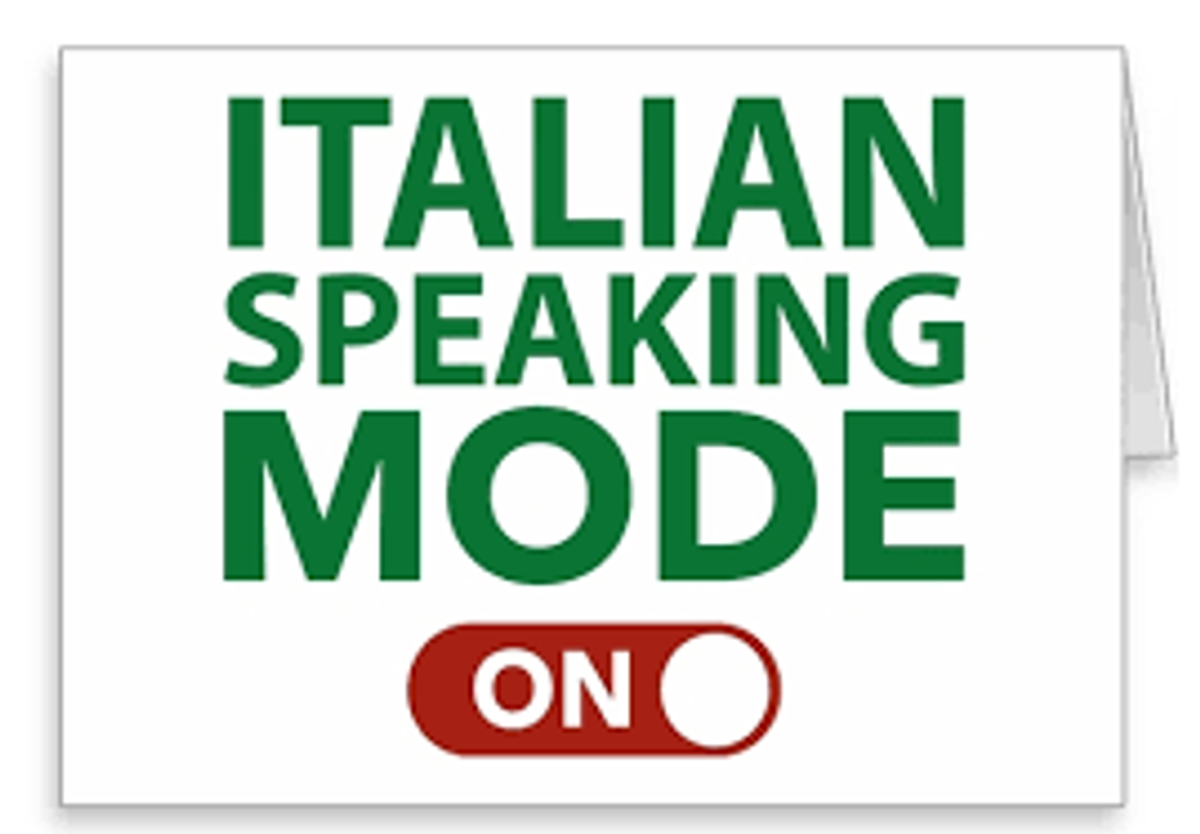
Modi Di Dire
Words that exist only in Italian
Every language contains certain words or phrases that just can’t be translated into a single English word. Italian is full of examples. Some of these words are used in everyday speech, while others may be used only in poetry or politics.
Here are some interesting ‘untranslatable’ Italian words, along with a best attempt at translating them!
Magari
This is a tricky word for English speakers to grasp as it has so many different meanings that don’t always directly translate. Typically, it’s translated as “even if”, “maybe” or “probably” in a sentence. But as an exclamation, “magari!” is an expression of a strong desire. For example, if someone asks if you’d like to win first prize in the lottery, you may truthfully say, “magari!”
Although there’s no single-word equivalent in English, in this context it means: “If only it were true!”
Modi Di Dire
Passare la notte in bianco.
Literally: To pass the night in white.
Meaning: To have a sleepless night.
English equivalent: To not sleep a wink.
Don't forget these Modi Di Dire
Meriggiare
Stemming from the word meriggio (noon), this beautiful verb means to rest at midday in a shady spot.
Liscio come l’olio
Literally: Smooth as oil
Meaning: Something that goes well, without problems or obstacles, or is easily done.
English equivalent: Smooth as silk. Right as rain.
Avere l’argento vivo addosso
Literally: To have quick silver (distilled mercury).
Meaning: To not be able to sit still.
English equivalent: To be all worked up.
Attaccabottoni
That chatty nonno (Grandpa) at the bottom of your road who is determined to stop you for half-hour conversations each time you pass? He’s an attaccabottoni. It means someone who, literally, “attacks your buttons”. In English we’d say: they buttonhole you.
Qualunquismo
In Italian, qualunque can be translated as “whatever”, to indicate indifference. The noun qualunquismo means an attitude of distrust, scepticism and apathy towards politics – something like “meh-ism”.
The word can be traced back to the right-wing populist, monarchist and anti-communist party, the Fronte dell’Uomo Qualunque (Common Man’s Front). Formed in 1946 just after the Second World War, the party offered an apolitical alternative to both fascism and anti-fascism.
Raro come una mosca bianca
Literally: Rare as a white fly.
Meaning: As white flies do not exist, this expression is used to describe something or someone that is incredibly rare or uncommon.
English equivalent: Rare as gold. Rare as hen’s teeth. Once in a blue moon.
Sprezzatura
This word is so untranslatable that it has sometimes been used in English. The best definition is “studied carelessness” or well-faked nonchalance.
(Non) Avere poco sale in zucca
Literally: To (not) have little salt in pumpkin.
Meaning: A person who is (not) rather silly or very intelligent.
English equivalent: (Not) on the ball.
Avere l’argento vivo addosso
Literally: To have quick silver (distilled mercury).
Meaning: To not be able to sit still.
English equivalent: To be all worked up.
Pantofolaio
“Couch potato” is probably the closest translation, but it doesn’t quite capture the humour of this Italian word. Pantofole means slippers in Italian, and a pantofolaio is someone who prefers the quiet home life (hence the slippers) and avoids any activity that disrupts tranquillity.
Raro come una mosca bianca
Literally: Rare as a white fly.
Meaning: As white flies do not exist, this expression is used to describe something or someone that is incredibly rare or uncommon.
English equivalent: Rare as gold. Rare as hen’s teeth. Once in a blue moon.
Menefreghista
The Italian phrase “Non me ne frega!” uttered in Italy means: “I don’t care!”
In Italian there’s also a noun to describe someone who’s particularly prone to this way of thinking, someone who regularly doesn’t care.
Non sono tutte rose e violini
Literally: Not everything is roses and violins.
Meaning: Not everything is beautiful or sweet.
English equivalent: Not everything is smooth sailing.
Buono come il pane
Literally: Tasty as bread.
Meaning: A good-hearted and generous person.
English equivalent: As good as gold
Ma piantala!
Literally: But plant it!
Meaning: Ask someone to stop doing something or that you don’t believe something.
English equivalent: Cut it out! Come off it! Come on! Give me a break!
In bocca al lupo!
Literally: In the mouth of the wolf!
Meaning: Good luck! The appropriate response would be, “Crepi!” (May the wolf die).
English equivalent: Break a leg!
Dare carta bianca.
Literally: To give a white card.
Meaning: To allow someone to do as they choose.
English equivalent: To give free reign.
Cascarci come una pera (cotta).
Literally: To fall for something or someone like a (baked) pear.
Meaning: When somebody has fallen for something.
English equivalent: To fall for it. To fall head over heels.
Avere il prosciutto sugli occhi.
Literally: To have your eyes wrapped in ham.
Meaning: To miss the obvious; to be too blind to see the obvious.
English equivalent: Looking through rose-tinted glasses means to see only the good things, not bad. Pulling the wool over their eyes is also possible, but used more for when someone is being misled.
Non vedo l’ora!
Literally: I don’t see the hour!
Meaning: I am excited! I can’t wait to do something!
English equivalent: I can’t wait!
Fa un freddo cane!
Literally: It’s dog cold!
Meaning: It is really, really cold.
English equivalent: This is probably best looked up online – adult censoring.
Essere in gamba.
Literally: To be in leg.
Meaning: Someone is very capable, clever or competent.
English equivalent: A bright spark.
Acqua in bocca!
Literally: water in the mouth.
Meaning: Don’t tell anyone! It’s a secret! Keep it quiet!
English equivalent: Mum’s the word.
Passare la notte in bianco.
Literally: To pass the night in white.
Meaning: To have a sleepless night.
English equivalent: To not sleep a wink.
Che cavalo!
Literally: What cabbage!
Meaning: A euphemism for an extremely common parolaccia (swear word) that sounds similar.
English equivalent: What the heck! (also a euphemism for a parolaccia).



